太阳风电流表和deHoffmann-Teller分析。第一个结果来自太阳轨道飞行器的直流电场测量
IF 26.5
1区 物理与天体物理
Q1 ASTRONOMY & ASTROPHYSICS
引用次数: 2
摘要
上下文。太阳轨道器于2020年2月10日发射,目的是利用为远程和现场研究设计的有效载荷仪器研究太阳和日球层物理。与最近发射的帕克太阳探测器类似,与早期的任务不同,太阳轨道器携带了用于测量低频直流电场的仪器。目标本文对太阳轨道器上的射电和等离子体波仪(RPW)测量的低频直流电场质量进行了评价。特别地,我们探讨了利用太阳轨道飞行器的直流电场和磁场数据来估计太阳风速度的可能性。方法。基于对电场和磁场的测量,我们使用了deHo ff mann-Teller (HT)分析来找到太阳风电流片的速度,它使电场的单个成分最小化。通过比较质子和α粒子传感器(PAS)测量的质子速度,我们建立了一个简单的电场探头有效天线长度leff模型。然后我们用高温法估计太阳风的速度。结果。利用高温法,我们发现观测到的y的变化往往与磁场的变化非常吻合。然而,ey的大小是不确定的,因为eff取决于等离子体环境。在这里,我们推导出了一个关于e - ff和德拜长度的经验模型,我们可以用它来改进对e - y的估计,从而改进对太阳风速度的估计。结论。RPW提供的低频电场质量高。使用deHo off mann-Teller分析,太阳轨道器的磁场和电场测量可以用来估计当等离子体数据不可用时太阳风的速度。本文章由计算机程序翻译,如有差异,请以英文原文为准。
Solar wind current sheets and deHoffmann-Teller analysis. First results from Solar Orbiter's DC electric field measurements
Context. Solar Orbiter was launched on 10 February 2020 with the purpose of investigating solar and heliospheric physics using a payload of instruments designed for both remote and in situ studies. Similar to the recently launched Parker Solar Probe, and unlike earlier missions, Solar Orbiter carries instruments designed to measure low-frequency DC electric fields. Aims. In this paper, we assess the quality of the low-frequency DC electric field measured by the Radio and Plasma Waves instrument (RPW) on Solar Orbiter. In particular, we investigate the possibility of using Solar Orbiter’s DC electric and magnetic field data to estimate the solar wind speed. Methods. We used a deHo ff mann-Teller (HT) analysis, based on measurements of the electric and magnetic fields, to find the velocity of solar wind current sheets, which minimises a single component of the electric field. By comparing the HT velocity to the proton velocity measured by the Proton and Alpha particle Sensor (PAS), we have developed a simple model for the e ff ective antenna length, L e ff of the E-field probes. We then used the HT method to estimate the speed of the solar wind. Results. Using the HT method, we find that the observed variations in E y are often in excellent agreement with the variations in the magnetic field. The magnitude of E y , however, is uncertain due to the fact that the L e ff depends on the plasma environment. Here, we derive an empirical model relating L e ff to the Debye length, which we can use to improve the estimate of E y and, consequently, the estimated solar wind speed. Conclusions. The low-frequency electric field provided by RPW is of high quality. Using the deHo ff mann-Teller analysis, Solar Orbiter’s magnetic and electric field measurements can be used to estimate the solar wind speed when plasma data are unavailable.
求助全文
通过发布文献求助,成功后即可免费获取论文全文。
去求助
来源期刊

The Astronomy and Astrophysics Review
地学天文-天文与天体物理
CiteScore
45.00
自引率
0.80%
发文量
7
期刊介绍:
The Astronomy and Astrophysics Review is a journal that covers all areas of astronomy and astrophysics. It includes subjects related to other fields such as laboratory or particle physics, cosmic ray physics, studies in the solar system, astrobiology, instrumentation, and computational and statistical methods with specific astronomical applications. The frequency of review articles depends on the level of activity in different areas. The journal focuses on publishing review articles that are scientifically rigorous and easily comprehensible. These articles serve as a valuable resource for scientists, students, researchers, and lecturers who want to explore new or unfamiliar fields. The journal is abstracted and indexed in various databases including the Astrophysics Data System (ADS), BFI List, CNKI, CNPIEC, Current Contents/Physical, Chemical and Earth Sciences, Dimensions, EBSCO Academic Search, EI Compendex, Japanese Science and Technology, and more.
 求助内容:
求助内容: 应助结果提醒方式:
应助结果提醒方式:


